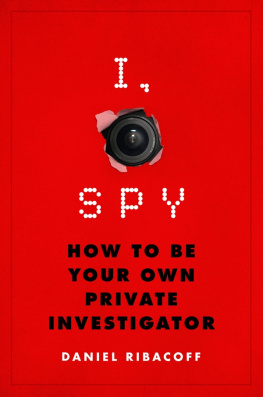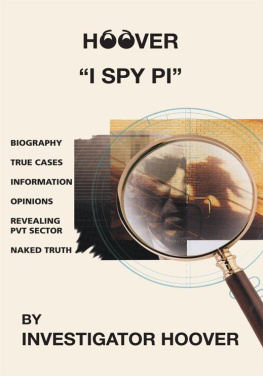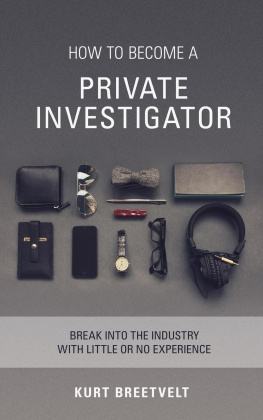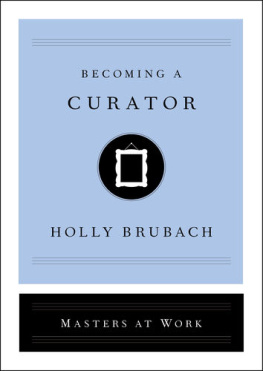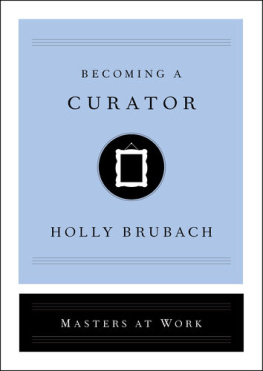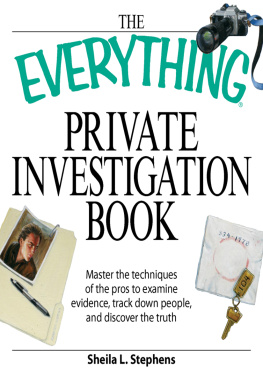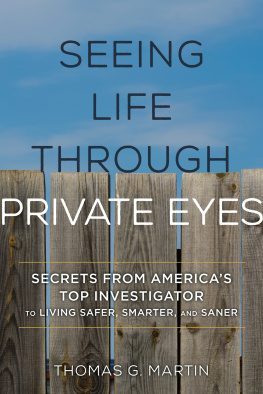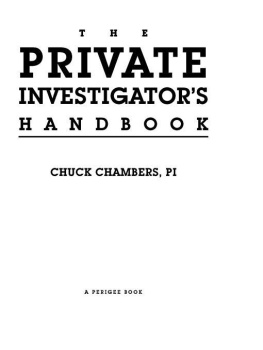Everybody wants to know the truth.
Your next-door neighbor says your kid hit a baseball through his front window, but your son says the guys nuts. Whos telling the truth? Your husband has been coming home late for the past two weeks and complains hes been slammed with work. Do you believe him? Or do you suspect that hes cheating on you? A young man applies for a job at your firm, and you dont know him from Adam, but his resumes stellar and he looks like a good kid. Should you hire him? Has he been fired from other jobs? Is he setting you up for harassment or for a hostile work environment lawsuit? How can you find out?
Private investigation is about digging through layers of lies and deception and coming out on the other side with that kernel of truth, the fact behind the fictionand the evidence to prove it. Its about finding and filtering information, getting whats coming to you, and protecting whats important to you. Its about getting to the bottom of a situation using your noodle and your know-how. And, with a little training and practice, you can do it like a pro.
For many years, my family owned a Midtown Manhattan diamond company and jewelry manufacturer, founded in 1979 by my father, a retired engineer. You want to know about theft and security and having eyes in the back of your head? Try being a diamond dealer. One day, my father went into the office early in the morning in order to meet with a courier from a jewelry store in a neighboring county. The doorbell rang, and my father answered the door to see that the courier had brought another man with himboth were armed with guns, a lead pipe, and an ice pick.
When security arrived within minutes, my father was unconscious on the floor. Portions of his scalp were hanging off from having been beaten with the lead pipe, and his shirt was bloody from being stabbed with the ice pick. My father survived the attack, but is legally blind to this day. The couriers accomplice was caught and served twenty-five years in prison. The courier, however, managed to escape. They never found him.
SITUATIONS IN WHICH YOU MIGHT EMPLOY INVESTIGATIVE TECHNIQUES
To obtain evidence of infidelity
To locate someone, be it a loved one, a birth mother, or someone who owes you money
To conduct a background check on a persona potential spouse, son-in-law, business partner, or employee
To locate assets
To go off-grid
Around this time, I joined the New York City Auxiliary Police, a team of volunteers who assist their local police precincts, housing police service areas, and transit districts. I served as a sergeant in the citywide special task force and received numerous awards of merit and commendations, including one from the National Police Hall of Fame. We performed uniformed patrol and were recruited, trained, and equipped by the New York Police Department (NYPD). (I served the NYPD until 1994 and have been serving the Nassau County Police Department as an auxiliary cop since 2006.) We did street patrol in every precinct in the city and worked special eventsJets games, parades, you name it. We were there for Mayor Ed Kochs first inauguration. I learned everything there was to know about New York City as an auxiliary copthe people, the streets. Neighborhoods that you never even thought of going to, we went to. And there was no GPS back then. In those days, if you didnt know where you were going, you didnt know where you were going, so you really learned your way in and around the city fast.
In 1990, I started the International Investigative Group. I came up with the idea of offering consulting investigative work for people like my father and others who worked jobs in industries that dealt in valuables and for which security was of utmost importance. I began working with Lloyds of London, Tiffany & Co.s insurance company, and other firms that insured jewelers, jewelry stores, traveling jewelry salesmen, and jewelry manufacturers.
For two years, I was a diamond dealer by day and private eye by night. I just put a phone on the wall and answered it every time it rangat the time, I had two kids, and my wife was pregnant with our thirduntil I could get the private investigation business up and running. I would come home at night, type reports, do research (remember, there was no Internet back then) until four oclock in the morning, get up a few hours later, and go back to work in the jewelry business.
Slowly, through word of mouth, the business grew. My first private investigative job was for Harry Winston; I investigated a courier who claimed he was robbed of $750,000. I branched out from therearmored truck losses, million-dollar burglaries, workers comp investigations, auto accidents, domestic suits. I put up my sail and went wherever the wind took me, building my investigative business one brick at a time.
Within a few years, I began studying with an established polygraph examinera real old-timer, with forty years experience under his belt. He was a little guy with a Hitler mustache, a bad toupee, and a deep voice, but when you spoke to him on the phone, youd think he was six foot nine. He started throwing me some investigative work so he could focus on polygraphing, more commonly known as lie detecting. He became my mentor, and years later, after he passed away, I incorporated polygraph services into my own business. I also studied formally under one of polygraph and forensic interviewings foremost researchers, Nathan J. Gordon, the director of the Academy for Scientific Investigative Training in Philadelphia, Pennsylvania, as well as William L. Fleischer, who serves as assistant director of the academy and is a former FBI and U.S. Customs polygraph expert.
THE STEVE WILKOS SHOW
The business grew steadily over the years, and I started getting calls to do TVI did technical consulting for the Guiding Light soap opera, where I set up a polygraph scene for an actor playing a detective, and I appeared on the National Geographic Channel as well as programs such as The Tyra Banks Show, The Millionaire Matchmaker, Impractical Jokers, and the Today show, among many others.
In early 2009, I got a call from The Steve Wilkos Show, a syndicated daytime talk show hosted by Steve Wilkos, who once served as director of security for The Jerry Springer Show. The producers were looking to hire a polygraph examiner in the New York tri-state areaat the time, NBC was moving production for shows such as Jerry Springer, The Steve Wilkos Show, Maury, and Deal or No Deal from Chicago to Connecticut. I was like, Deal or No Deal? I get to see the models? I love Model 21! I went for the interview, they liked me, and I began working for them that year.
A former Chicago cop, Steve Wilkos is a great guy and a great interviewer. We sort of make a Lone Ranger and Tonto type of team. Since Ive been there, the show has focused more on criminal investigation rather than relationship topics. We cover everything from murder to molestation. Im their polygraph guy. They turn to me to help weed out the liarsguy comes on, says he never cheated on his girlfriend, and then, after conducting a thorough polygraph exam, I deliver the report to Steve that says whether the guys telling the truth or is full of crap.

